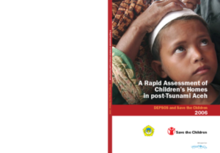The Government of Indonesia took an essential step in the aftermath of this disaster by adopting the Policy on Separated, Unaccompanied and Single-parent Children affected by Emergency Situations (2005) which clearly stated that “every effort must be undertaken so as to ensure that children are able to stay with their families and communities.” By recognising the fundamental importance of families to the care and protection of children, it emphasised that the placement in institutions should be a last resort and that a range of support should be given to single parents or extended families left to care for affected children.
Over a year after the disaster, this crucial policy is now at risk in the face of the daunting challenges facing many families in Aceh. This research shows that reliance on institutional care is still very strong in Aceh. Thousands of children affected by the tsunami are languishing in orphanages in Indonesia despite having at least one parent alive; more than 85 per cent of the 2,589 children who were placed into institutions after the tsunami still have at least one parent alive, and 42 per cent still have both parents. Many families have been forced to place their children in homes is because they were unable to give them the right standard of care, shelter or education. Half of the children in the institutions were placed there some time after the disaster, indicating that their families found they were unable to care for the children rather than that the child’s parents had died.
Nevertheless, resources which should help families care for their children continue to be diverted to institutions instead. Because most funding for institutions is linked to the number of children living there, some orphanages are ‘recruiting’ children from the tsunami-affected area of Aceh and working to keep them in institutional care. This paper argues that this way of allocating funding is damaging as no assessments on the needs of the children were carried out.
The findings of this research underscore the importance of strengthening support to families, particularly in post-emergency situations, so that parents are able to fully address their role in the care and protection of their children. The data and analsyis provided on the situation of the Children’s Homes in Aceh will be invaluable to support work to move towards the current reform of the social homes by the Ministry of Social Affairs, which aims to transform these institutions into less residential and more open facilities for family support.
Specifically, this report calls for:
-
Priority to be given to interventions that directly target families facing challenges in the care of their children, with particular focus on single parents and extended families caring for tsunami- affected children
-
Funding to be shifted away from supporting institutions and instead support family and community based interventions that are sustainable, including ensuring families can afford full education costs for their children
-
No new children’s homes to be built in Aceh without prior assessment that shows a clear need for such an institution
-
Regular contact between children and their parents, families and relatives should be encouraged and facilitated including frequent home visits
Many children affected by the Tsunami continue to miss out on the care and protection of their parents. Indonesia is at a crossroad in terms of how it responds to the challenge of caring for its most vulnerable children – support must be given to benefit families rather than the institutions that keep them apart.
©Depsos IR and Save the Children

